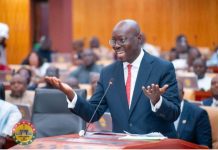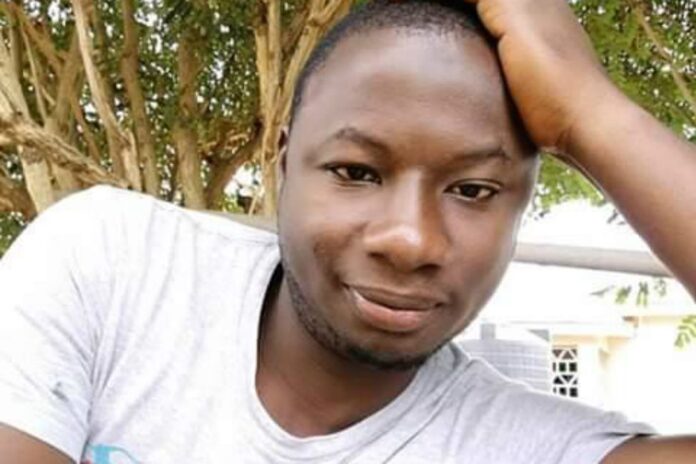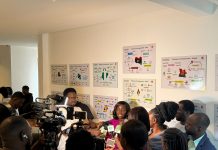The January 16, 2019, murder of Ghanaian journalist Ahmed Hussein-Suale Divela, who was gunned down by unidentified men months after threats by a local politician, sent shockwaves through the country’s press corps and yielded promises from leaders to find the killers and bring them to justice.
But four years later – despite police assurances of progress and two arrests – nobody has been tried or convicted in the journalist’s murder. Meanwhile, crimes against journalists continue.
Since Divela’s death, at least 30 other Ghanaian journalists and media workers have faced abuses in connection with their work, including attacks, threats, and arrests.
Ahead of the fourth anniversary of Divela’s murder, CPJ followed up on each of these cases to learn whether anybody had been held responsible. While there were a few patchy attempts at accountability, CPJ found a broad pattern of impunity that flies in the face of Ghana’s reputation as a stable democracy where freedom of the press is enshrined in the country’s constitution.
Since 2019, CPJ’s research shows that 14 journalists and media workers have been physically attacked in relation to their work – nine of them by members of Ghana’s police or military. The attacks have continued in spite of Ghana’s police and media groups adopting a 2019 framework for improved relations and the safety of journalists. Officials involved were rarely disciplined, and when action was taken journalists said it was insufficient.
In one incident, police officers kicked and punched journalist Malik Sullemana when they arrested him in March 2019, leaving him with blood clots in his left eye and bruises on his limbs. Police temporarily suspended three officers while they conducted an investigation, but Sullemana said that he received no further update about the inquiry. He said that he has since seen several officers involved back on the street in uniform.
“When something happens people talk about it and then it fizzles out,” said Sullemana, one of the 17 Ghanaian journalists and media workers detained since 2019, most of them briefly.
CPJ found that at least 10 journalists have received written or verbal threats in connection with their work over the past four years. That includes Erastus Asare Donkor, who went into hiding after he was threatened on television by parliament member Kennedy Ohene Agyapong in July 2021.
Agyapong, who had also threatened Divela before his murder, said Donkor should be “beaten seriously” over his reporting about Ghanaian officers’ alleged shooting of protesters. Police and parliament both opened investigations into Agyapong’s statement, but the journalist said he was never informed of the findings.
In addition, since 2019, CPJ has documented attacks on the offices of at least three private broadcasters – Benya FM, Zylofon FM, and Radio Ada FM – during which the assailants assaulted journalists, vandalized the premises, or stole equipment. In separate interviews, staff from each of the outlets said the authorities’ responses were insufficient.
In the January 2021 attack on Zylofon FM, for instance, the broadcaster’s security guard shot the attacker and police apprehended the injured man, but after he recovered he escaped from the hospital and has not been rearrested, according to Zylofon presenter Ahmed Abubakar.
The broad lack of accountability has resulted in a tendency toward self-censorship among members of the media, say those interviewed by CPJ.
“Journalists will always balance a likely attack against the benefits of the story they are pursuing,” said Muheeb Saeed, senior Africa program officer with the Media Foundation for West Africa, a Ghana-based organization that monitors press freedom across the region.
He questions whether Ghana’s authorities have the will to protect the press. “The state is too powerful to fail if it actually meant to stamp out impunity. At the highest level there is no commitment.”
Sullemana, for his part, said the attacks amounted to a stain on the country’s reputation. “We are one of the countries in Africa that the rest of the world looks up to. The world considers Ghana as a country of good governance and rule of law,” he told CPJ. But, he said, “it is not safe to practice journalism in Ghana.”
CPJ emailed Ghana’s police press office and its parliament but received no response. Phone calls to police spokesperson Grace Ansah Akrofi went unanswered. CPJ also emailed Ghana’s military but received no response.
Here are details of the cases involving the 30 journalists who have faced abuses for their work since Divela’s murder and what, if anything, authorities have done to respond.
Malik Sullemana and Raissa Sambou Ebu, reporters for the state-owned Ghanaian Times, were attacked by police in March 2019, and Sullemana was also arrested. Police temporarily suspended three officers involved and opened investigations into others, but Sullemana told CPJ the journalists received no follow up from authorities and that he subsequently saw the officers who attacked him on the street in uniform.
Emmanuel Ajarfor Abugri and Emmanuel Yeboah Britwum, an editor and a reporter with the privately owned news website Modern Ghana were arrested by officers from Ghana’s Ministry of National Security in June 2019. Officers confiscated their phones and laptops, and allegedly tortured Abugri.
He sued the National Security Coordinator, Inspector General of Police, and Attorney General over the incident and in June 2022 those authorities settled the case, agreeing to publish an apology to Abugri, to recover his confiscated devices, and to compensate the journalist 50,000 Ghanaian cedis (US$ 4,946), according to court documents reviewed by CPJ.
As of early 2023, Abugri had received no apology nor the money he is owed, according to his lawyer, Samson Lardy Anyenini. In addition, authorities named in the lawsuit appear to want to revisit the settlement. In a letter, which CPJ reviewed, they asked the journalist’s lawyer to “discuss a proposed revision” of the requirement for an apology.
Bestway Zottor, director of privately owned broadcaster Radio Tongu, was arrested and detained for two days in January 2020 after authorities accused him of using his radio station to promote separatist agitation. The next month, authorities closed down the broadcaster, which remained closed as of early this year, Zottor told CPJ.
Samuel Adobah, a journalist with the privately owned TV Africa broadcaster was attacked by security officers in April 2020. Adobah told CPJ that the military sent him a letter of apology saying the officer who attacked him would be penalized and the military would compensate medical bills for injuries incurred during the attack.
Adobah said that he never learned what happened to the officer nor did he receive any money from the military, which did replace a phone that an officer smashed.
Yussif Abdul Ganiyu, a reporter for the German government-funded Deutsche Welle, was attacked and briefly detained by security officers in April 2020. Ganiyu told CPJ that Deutsche Welle reported the incident to the Ministry of Information and that he gave a statement to the military police about the attack but that nobody followed up with him.
Emmanuel Ohene-Gyan, an editor with the privately owned radio broadcaster Empire FM, was threatened by a family member of a politician in June 2020 over Ohene-Gyan’s reporting that the politician died of COVID-19.
The individual said that he must remove his reporting or face the family’s anger. Ohene-Gyan told CPJ that he didn’t report the threats to police because he believed they wouldn’t be taken seriously.
Rebecca Asheley Amarh, a reporter with the privately owned Kingdom FM radio broadcaster, was briefly arrested in June 2020. In the same incident, police threatened Philip Akutey Azu, a reporter for the privately owned Atinka TV broadcaster. The two were forced to delete their footage of police slapping a delegate of a local political party. Amah told CPJ that they provided a statement to the Ghana Journalists Association about the incident, but did not learn if anyone had been held to account.
Stanley Nii Blewu was beaten by soldiers when both he and Joseph Armstrong Gold-Alorgbey were briefly detained in August 2020. The two reporters for the privately owned TV3 broadcaster had been reporting on a sanitation project. At the time, a military spokesperson told CPJ it was a “misunderstanding” that had been resolved. Blewu said that he didn’t hear further from the military.
David Tamakloe, editor in chief of the privately owned Whatsup News, was arrested and criminally charged for “false news” reporting in October 2020. Tamakloe was again arrested and detained by authorities on separate “false news” allegations in April 2021, but has not been formally charged.
Tamakloe told CPJ that his 2020 case was ongoing, but his last hearing was in December of that year and he has not been notified of the status of the case.
Oheneba Boamah Bennie, a host with the privately owned Power FM broadcaster, was arrested and detained by authorities in December 2020. Authorities sentenced the journalist in February 2022 to two weeks in prison and fined him 3,000 Ghana cedis ($US468) on a contempt of court charge over posts about politics he made on Facebook.
In December 2020, Afia Pokuaa, an anchor with privately owned Despite Media, was threatened with death for her reporting on that year’s general election by a Ghanaian YouTube personality. She left the country for several weeks as a result. She said she reported the threats to police but received no follow up.
In late December 2020, freelance investigative journalist Manasseh Azure Awuni was threatened with death in emails over his election reporting. He said he reported the threats to police, but they closed the case after failing to find the perpetrators.
In January 2021, Phillip John Quartey, an anchor with the privately owned broadcaster Metro TV, and a colleague he declined to name for security reasons were verbally threatened by two unidentified men who exited a car and told him they wanted to kill him over his reporting. Philip said he reported the matter to police, who told him they were investigating and would get back to him. As of early 2023, he had not heard from them.
In early January 2021, an unidentified man broke into the office of privately owned radio broadcaster Zylofon FM and began shouting the name of anchor Ahmed Abubakar before pepper spraying a technician and vandalizing equipment. Abubakar was unharmed and a security guard shot the man. Police took him to the hospital but he escaped and remains at large.
Erastus Asare Donkor, Kofi Asare, and Michael Sakyi, respectively a reporter, a camera operator, and a driver for YouTube-based news outlet Joy News, were arrested and detained, and their car attacked by soldiers in January 2021. Donkor told CPJ that the military conducted an investigation but he was never apprised of any findings.
In a separate incident, politician Kennedy Ohene Agyapong said Donkor should be “beaten seriously” for his reporting in July 2021. Donkor told CPJ that Agyapong had not been held accountable for his actions as police and parliament did not release the findings of their investigations into the incident.
Caleb Kudah and Zoe Abu-Baidoo Addo, reporters with the privately owned Citi FM broadcaster, were arrested and detained by Ghanaian police in May 2021, and officers beat Kudah in custody. Ghanaian authorities announced the suspension of four officers involved, but within days local media reported that one of the suspended officers was reinstated and promoted.
Korle Adjaotor Sorngortse, Ruby Ate, and Gideon Amanor Dzeagu, staff of privately owned broadcaster Radio Ada FM, were attacked in January 2022 at their office by 10 masked and armed men, who threatened to come back and shoot them if they didn’t stop reporting on a specific story. Authorities opened an investigation into the incident, but Dzeagu told CPJ in early 2023 that “we have not received any feedback from the police.”
Eric Nana Gyetuah, a producer with privately owned broadcaster Connect FM, was arrested and attacked by police officers in February 2022. Gyetuah told CPJ that police officers had assured him months after the attack that they would inform him if they had any update on their investigation. He has not heard anything since.
Michael Aidoo, a member of an investigative journalism fellowship program organized by the local press freedom group Media Foundation for West Africa, was attacked by soldiers who apprehended him and took him to a military base in March 2022. Muheeb Saeed, a senior program officer at the foundation, told CPJ in early 2023 that the defense ministry had not responded to a letter it sent requesting an investigation into the incident.
Eric Blessing Eshun and Emmanuel Egyirfah, a host and a producer with privately owned broadcaster Benya FM, were attacked in May 2022.
Ghanaian police charged three men for the attack but local media reported that the men pleaded not guilty and were granted bail within days. The journalists’ colleague, Usman Kwaku Dawood, told CPJ that a ruling in the case was expected on January 25.










































